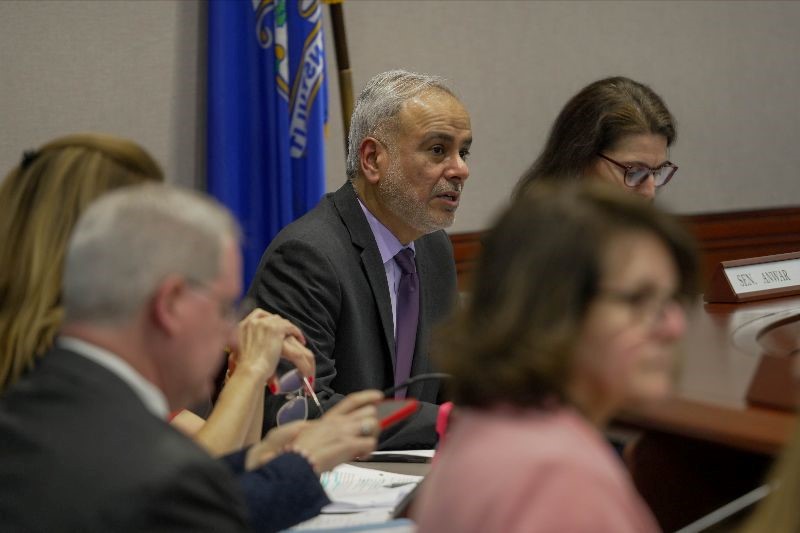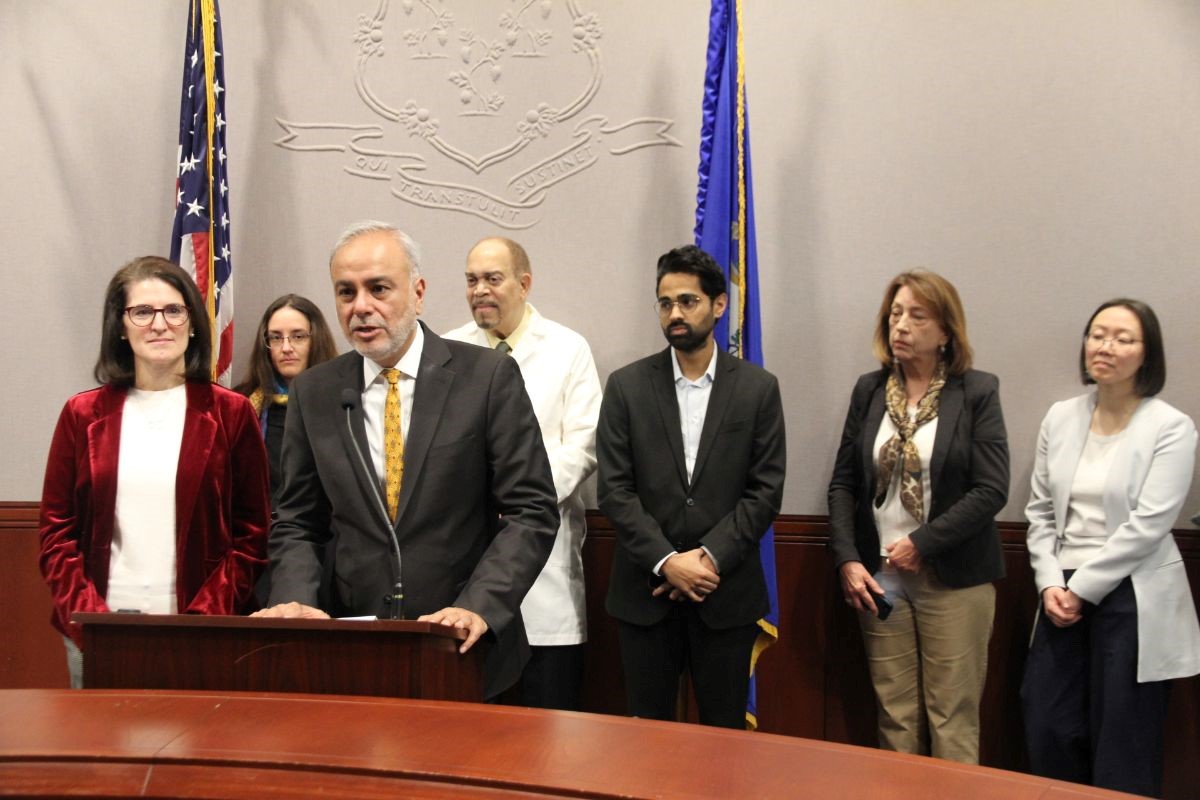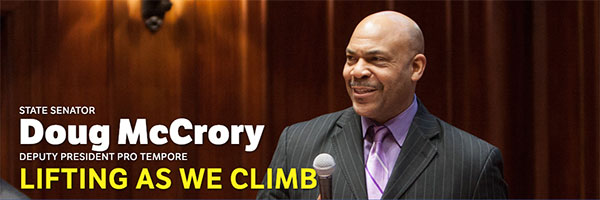
Senate Democrat Priority Bills on AI and Price Gouging Pass in Committee Meeting, Heading to Senate Floor
Today, during the General Law Committee meeting, two Senate Democrat priority bills were voted on and passed, and now head to the Senate floor.
State Senator James Maroney (D-Milford), Chair of the General Law Committee, lead passage of Senate Bill 2, ‘An Act Concerning Artificial Intelligence’ and Senate Bill 3, ‘An Act Concerning Consumer Protection and Safety,’ during the meeting this morning. Both bills will be heard next on the Senate floor.
“Senate Bill 2 is an important opportunity to capitalize on innovation, enhance AI in the workforce, and protect consumers,” said Senate President Pro Tempore Martin Looney and Senate Majority Leader Bob Duff. “It establishes a range of new programs from the national discussion on AI but does so by integrating them into existing state operations. It will establish Connecticut as a leader for how government should protect individuals, promote AI with businesses, and empower workers.”
“Senate Bill 3 is important legislation for Connecticut consumers and all residents,” said Senate President Pro Tempore Martin Looney and Senate Majority Leader Bob Duff. “With the benefits of technological innovation comes consumer concerns involving privacy, transparency, and affordability. Connecticut has a duty to its citizens to both foster innovation and regulate the market to ensure the safety of its consumers.”
“Today marks a significant step forward for both innovation and consumer protection in our state,” said Sen. Maroney. “As chair of the General Law Committee, I am incredibly proud that we have passed out of committee two critical pieces of legislation: one to regulate artificial intelligence, ensuring its responsible development and use, and another to combat price gouging and protect consumers. These bills reflect our commitment to keeping pace with technology while safeguarding the interests of our constituents. I look forward to working with my colleagues to see these bills through to final passage.”
“I am proud to stand beside Senate Chair Maroney in his nationally recognized efforts to pass significant consumer protections for residents of our State. Senate Bill 2 is a strong statement on behalf of Connecticut residents that both embraces the role that AI development will have in improving the lives of so many people in our State while also protecting them from potential misuses,” said Representative Roland Lemar (D – House Chair of General Law). “And in Senate Bill 3 we are passing important consumer rights to protect our residents against price gouging, unfair trade practices, corporations limiting our right to repair certain consumer goods and more.”
“The passage of SB 2 is a major step forward in making sure artificial intelligence works for the people of Connecticut—not the other way around,” said Representative Hubert Delany. “AI is already being used to make decisions that affect people’s lives. With SB 2, we’re putting guardrails in place to make sure those decisions are fair, transparent, and accountable.”
Senate Bill 2 will work to create regulations for Artificial Intelligence in Connecticut. This bill will focus on:
-Transparency and accountability;
-Training Connecticut’s workforce to use artificial intelligence;
-Criminalization of non-consensual intimate images.
On May 17, 2024, Colorado passed the first comprehensive Artificial Intelligence bill in the United States. Colorado’s bill will impose obligations on developers and deployers of high-risk AI systems in an effort to protect consumers from discriminatory consequential decisions by such systems. It primarily targets AI systems that make significant decisions impacting individuals access to services like education, employment and healthcare.
Transparency and Accountability
This legislation will reveal discrimination where AI is being used to make important decisions about people’s lives, like housing, lending, employment, and government services. 80-88% of companies are using AI to make employment decisions. 50-70% (depending on survey) or large landlords are using AI for screening tenants.
Criminalizing Deepfake Porn
Under this legislation, the bill will update outdated law to prohibit the use of AI to make deepfake porn of people, including the use of AI to create revenge porn.
Workforce Development and Training
The intersection of workforce development and artificial intelligence (AI) presents both opportunities and challenges. While AI can improve productivity and lead to innovations, its impact on the workforce has raised concerns about potential negative consequences.
Challenges can include automation, skill gaps and economic inequality. While AI can create new jobs, these roles often require specialized skills, meaning employees may need to reskill, which can be difficult without access to education or training programs. To mitigate these challenges, workforce retraining should be made accessible. This legislation will work to provide training opportunities to Connecticut residents while reaching people where they are.
Senate Bill 3 will enact new consumer protections aimed at affordability and a public health proposal designed to shield Connecticut from impending federal policy changes that could threaten the health of state residents.
Connecticut families have struggled with the affordability of goods and services for the last several years as a result of inflation and supply chain disruptions related to the pandemic. However, some corporations have used these conditions as a pretense to extract additional profits from hardworking families through a form of price gouging that occurs before the product is ever placed on a store shelf.
Although Connecticut currently has laws to prevent price gouging, these policies have two critical limitations: they can only be enforced against retailers, and they only apply during major disasters or when an emergency has been declared. In other words, price gouging is essentially permitted in all but the most dire circumstances.
Through Senate Bill 3, Senate Democrats plan to target the kinds of price gouging that drive up costs behind the scenes as manufacturers, distributors, wholesalers and suppliers artificially inflate prices to pad their bottom lines.
The legislation will also expand the scope of Connecticut’s price gouging prohibition beyond emergency situations by allowing the attorney general to issue notices of abnormal economic disruption. These notices would apply to significant interferences in the production, distribution, supply, sale or availability of necessary consumer goods like diapers, baby formula, or prescription medications.
The proposal gives the attorney general the authority to enforce the new price gouging prohibition under the Connecticut Unfair Trade Practices Act.
FOR IMMEDIATE RELEASE
Contact: Michelle Rappaport | Michelle.Rappaport@cga.ct.gov| 508-479-4969








